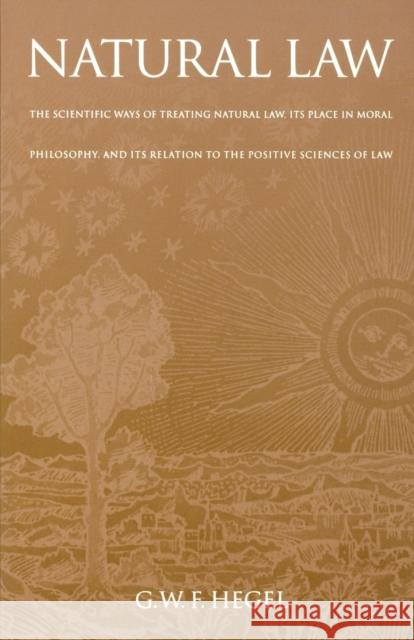Natural Law: The Scientific Ways of Treating Natural Law, Its Place in Moral Philosophy, and Its Relation to the Positive Sciences » książka
Natural Law: The Scientific Ways of Treating Natural Law, Its Place in Moral Philosophy, and Its Relation to the Positive Sciences
ISBN-13: 9780812210835 / Angielski / Miękka / 1975 / 144 str.
Natural Law: The Scientific Ways of Treating Natural Law, Its Place in Moral Philosophy, and Its Relation to the Positive Sciences
ISBN-13: 9780812210835 / Angielski / Miękka / 1975 / 144 str.
(netto: 93,24 VAT: 5%)
Najniższa cena z 30 dni: 96,71
ok. 22 dni roboczych.
Darmowa dostawa!
"The publication of . . . this book is an intellectual event."--Alasdair MacIntyre One of the central problems in the history of moral and political philosophy since antiquity has been to explain how human society and its civil institutions came into being. In attempting to solve this problem philosophers developed the idea of natural law, which for many centuries was used to describe the system of fundamental, rational principles presumed universally to govern human behavior in society. By the eighteenth century the doctrine of natural law had engendered the related doctrine of natural rights, which gained reinforcement most famously in the American and French revolutions. According to this view, human society arose through the association of individuals who might have chosen to live alone in scattered isolation and who, in coming together, were regarded as entering into a social contract. In this important early essay, first published in English in this definitive translation in 1975 and now returned to print, Hegel utterly rejects the notion that society is purposely formed by voluntary association. Indeed, he goes further than this, asserting in effect that the laws brought about in various countries in response to force, accident, and deliberation are far more fundamental than any law of nature supposed to be valid always and everywhere. In expounding his view Hegel not only dispenses with the empiricist explanations of Hobbes, Hume, and others but also, at the heart of this work, offers an extended critique of the so-called formalist positions of Kant and Fichte. "An invaluable translation . . . of a document in his fruitful Jena period which is crucial to our understanding of Hegel's maturity. This essay on natural law throws much light on the Phenomenology soon to appear as well as the later Philosophy of Right. It amounts to a philosophical declaration of independence for Hegel: his departure from the theological preoccupations of his youth on the one and the tutelage of Kant and Fichte on the other. The Phenomenology of Spirit will announce his independence from Schelling, too, and philosophy will henceforth play for him the role formerly held by religion in the life and destiny of a people."--J. Glenn Gray "It is an immense advantage to students of political philosophy in general, and to Hegel scholars in particular, to have Hegel's early essay on the scientific treatment of natural law available in English. . . . Acton's introduction supplies useful historical background and will assist those unacquainted with Hegel . . . to sort out the main argument."--Errol E. Harris
"The publication of . . . this book is an intellectual event."--Alasdair MacIntyreOne of the central problems in the history of moral and political philosophy since antiquity has been to explain how human society and its civil institutions came into being. In attempting to solve this problem philosophers developed the idea of natural law, which for many centuries was used to describe the system of fundamental, rational principles presumed universally to govern human behavior in society. By the eighteenth century the doctrine of natural law had engendered the related doctrine of natural rights, which gained reinforcement most famously in the American and French revolutions. According to this view, human society arose through the association of individuals who might have chosen to live alone in scattered isolation and who, in coming together, were regarded as entering into a social contract. In this important early essay, first published in English in this definitive translation in 1975 and now returned to print, Hegel utterly rejects the notion that society is purposely formed by voluntary association. Indeed, he goes further than this, asserting in effect that the laws brought about in various countries in response to force, accident, and deliberation are far more fundamental than any law of nature supposed to be valid always and everywhere. In expounding his view Hegel not only dispenses with the empiricist explanations of Hobbes, Hume, and others but also, at the heart of this work, offers an extended critique of the so-called formalist positions of Kant and Fichte."An invaluable translation . . . of a document in his fruitful Jena period which is crucial to our understanding of Hegels maturity. This essay on natural law throws much light on the Phenomenology soon to appear as well as the later Philosophy of Right. It amounts to a philosophical declaration of independence for Hegel: his departure from the theological preoccupations of his youth on the one and the tutelage of Kant and Fichte on the other. The Phenomenology of Spirit will announce his independence from Schelling, too, and philosophy will henceforth play for him the role formerly held by religion in the life and destiny of a people."--J. Glenn Gray"It is an immense advantage to students of political philosophy in general, and to Hegel scholars in particular, to have Hegels early essay on the scientific treatment of natural law available in English. . . . Actons introduction supplies useful historical background and will assist those unacquainted with Hegel . . . to sort out the main argument."--Errol E. Harris











